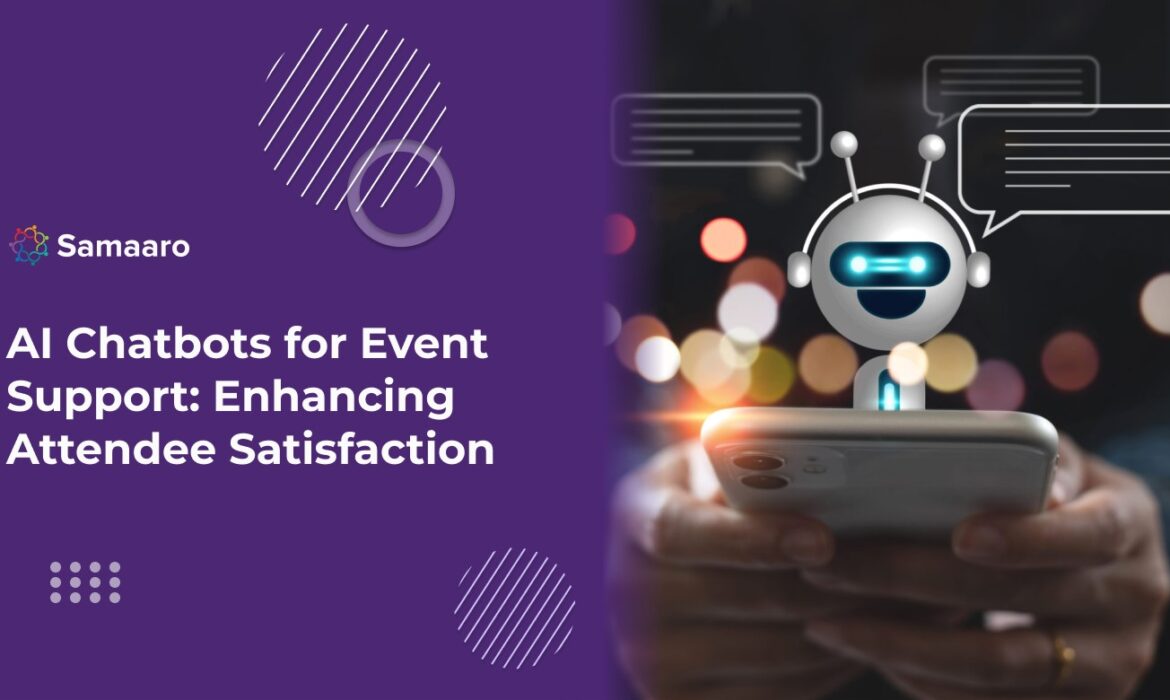Samaaro + Your CRM: Zero Integration Fee for Annual Sign-Ups Until 30 June, 2025
- 00Days
- 00Hrs
- 00Min

The latest iteration of AI chatbots has quickly become a game-changer in the world of support for events. It’s changing the way people engage with event managers, interact with event information. AI chatbots are artificial intelligence powered virtual assistants that will engage attendees through conversation, answer questions, and provide valuable information and insights in real-time. AI chatbots streamline support by automating support function and increase the likelihood attendee satisfaction from support or event follow up questions.
AI chatbots as a part of event management systems can help create a responsive event for attendees. Because chatbots can provide real-time support, attendees can focus on what is on hand, networking and having fun. In this blog, we will cover the key features, advantages of AI chatbots for event support, and best practices for everyone to incorporate chatbots.
AI Chatbot Features for Event Support As events progress in developing a more intelligent event user experience for attendees, AI chatbots can provide real-time event assistance information, support to improve the overall experience for attendees. Below are some features of AI Chatbots to help with event support that is valuable:
Natural Language Processing (NLP) is an essential ai chat bot feature as it allows chatbots to create conversation and understand and communicate using human language. The NLP feature means staff or attendees can communicate using everyday voice and language, where the organization is represented by the chatbot, similar to the communication instead of an organization representative. NLP interprets questions, comments, and commands – therefore providing a more intuitive experience to the user when they can communicate using natural language. Overall, this means attendees can quickly and efficiently get correct and relevant information, increasing the value and experience in using the AI Chatbot.
AI chatbots can access knowledge base databases with event specific information. Examples include: itinerary, session location, speaker bio, FAQ feature, and more via a chat bot app. Once the AI chatbot is integrated with an updated central knowledge base, it should be able to accurately answer all knowledge-based queries, alleviating some staff pressure and significantly reducing misinformation to attendees while attending the event.
Personalized is the name of the game with the connection of attendee engagement with events. Research has indicated that when participants received personalized suggestions of sessions, workshops, networking activities, etc. based on the information they provided about their preferences and engagement as a part of their registration, they enjoyed their events and experienced content that was applicable to them, and therefore they fully engaged and used the entire event.
The other huge benefit of using an AI Chatbot in an event context is that the chatbot is available 24/7, while most human staff for an event have restricted working hours. The bot can interact with the attendees and help them with their questions, and at whatever time they may require support by also using the bot method; apply the hybrid feature, potentially through the draw or appeal of cleverness of the bot. This would also be situationally appropriate with international events, and power distances for those attendees who do not share your time zone. Whichever time it is, morning, or night, the chatbot can be used to assist attendees so that attendees will not feel alone and someone will come and support them.
AI chatbots can communicate in multiple languages to support a diverse audience. Having communication and support provided in the attendees’ first language enables event planners to support anyone accessing information or support they require.AI chatbots are important in bridging language divides, enabling inclusive practices and ultimately improving the experience of the international forums. When guests can communicate in their preferred language, companies can expand the range of communications with a continued welcoming culture for all.
AI chatbots can keep event guests up to date and sending guests information about scheduled sessions, changes in meetings, and reminders of important announcements. By sending guests information about their specific schedules, AI chatbots can avoid potential confusion, keep people informed in real time as the event unfolds and allow guests to take necessary actions. The guest preference for reminders can be the basis for how information is sent, creating a customized experience.
AI chatbots can source feedback from guests during and after the events. They can motivate users to offer feedback on one or more sessions, one or more speakers, or the event experience overall. Feedback is collected in real time so the organizer can get an immediate idea of how satisfied their guests were and if they had any issues. Organizers have access to accurate feedback just by using chatbots and should some issues arise, they can use feedback for future events or even email guests as soon as possible.
AI chatbots can help reach their maximum potential if they interact with additional event management tools and platforms. Workshop data can be transferred across the different AI Chatbot and partner platforms using the data on attendee experiences and preferences from a different platform (ex. registration systems or CRM tools) to really engage personally in a chat where the Chatbot can provide a personal interaction to users.
AI chatbots can collect information on how guest engages and collects some information of the habits and preferences of attendees. With that information, chatbots will be able, to report, document, and analyze the level of popularity at sessions and the most asked questions and what level of engagement people were generated. Organizers will be able to use analytics, to help improve their approach to prepare better for their following events and provide a better experience for their guests.
When you use all of these features AI chatbots will be a legit resource for your events, support your guests by creating a seamless informative but mostly enjoyable experience. The strength and power to provide a customized approach while also being able to interact with your guests in real-time to seek necessary information and support is the next step in providing an experience that every attendee will want to repeat. Creating memorable experiences and enhancing and hopefully retaining participants in every event moving forward.
AI chatbots have transformed event support, offering multiple value adds relative to the attendee experience and aspects of event management. Here are a few value-adds of AI chatbots for event support:
AI chatbots enhance attendee satisfaction by providing timely and effective responses to queries presented by the attendees. Attendees often have numerous questions in their minds leading up to, during, and after the event, such as; logistical questions, or what session might be a suitable choice. If an AI chatbot can answer some or all of these questions, the attendee does not have to waste precious time trying to find the right answer, this can also provide a less frustrating experience. This instant level of support would create a positive attendee experience, support continued engagement, and foster active participation at your event.
AI chatbots will support the flow of an event by aiding participants engage across several streams of a conference or event. Chatbots can support through session schedules, event lay-outs, and networking opportunities locally, to give attendees a useful and smooth experience, and understanding of the operational aspects of the event. The flow of event information is in the benefit of the chatbot and therefore engaging attendees more likely when they have easy and clear access to information. AI chatbots could even support smooth shifts between session or activities, so that the attendee is able to continue affordance to the sensation
Are you planning an event? If you’ve opted for AI chatbots to assist and enrich the attendee experiences, you may find additional savings reflected in your budget. AI chatbots answering frequently asked questions will reduce the amount of human staff needed, allowing organizations to better prioritize staffing costs, relying on the potential funds in other areas such as marketing, content creation, or enhancing experiences. Reducing staffing costs can be a significant measurement of the overall profitability of events.
AI Chatbots can help with increasing productivity by being able to recognize and automate processes. AI chatbots can check-in attendees, update events in real time, and even solicit feedback from attendees. By being able to automate these functions, staff can dedicate themselves to other activities and functions that require the presence of a human and allow for a little creativity and strategy. The more proficient that operations can run, the greater the potential to maximize resources.
When we think about the many benefits that you receive with AI Chatbots, one of the most paramount values is the data you can collect with participatory and interactional attendance engagement, the patterns of questions, the interactivity with attendance, and the popularity of each session or presentation. By measuring and analysing event data, organizations learn about audience behaviour and can subsequently employ that information to aid the planning of their next event as it relates to the marketing strategies out of the event, attendee experience, and/or to change the content and/or learning experience of the event. Organizations and planners will be able to analyze data and to identify and capitalize on it to understand what makes sense to the audience and then to refine and adapt their approach and initiatives toward their own audience.
AI chatbot, thrive on personalization while taking into account their attendee data and defined preferences. In other words, AI Chatbot can recommend conference sessions, speakers, or networking functions, that allow the attendee to participate or ultimately enjoy their conversation when they feel somebody knows and or cared about their preferences. By giving attendees what they want, they feel like they have a deeper and more enjoyable experience, when they feel understood and/or assisted they are participating in the events and experience – it is engagement! The AI chatbots can employ that specific user preference to tailor that users’ navigation in a conference experience that is geared toward them; additionally, by valuing and recognizing attendee particular sessions creates a totally unique experience for each attendee.
AI chatbots can be smart and useful in crisis and unexpected situations when a timely, critical message is needed to provide information, if the schedule changes and emergency messages to keep the participants safe and aware. Timely information would lessen confusion and stress for participants, so they could concentrate back on business at hand – the event – rather than potential interruptions.
Aside from its usefulness for events in real-time, AI Chat service provider platforms scale very well for an event. An event may have several hundreds or thousands of attendees – however the chatbots still provide service and support to all attending participants irrespective of what size, while maintaining the same level of service delivery and providing a seamless level of continuum in service. The event participant experience is much better, and level of overall customer service is elevated by AI Chatbots being part of the mix.
AI chatbots have been designed and programmed to respond to different types of events – conferences, trade shows, workshops & virtual events. They can respond to all diverse formats and industries which makes them a flexible support tool for organizers. The say it is easy to update and add new information or features to update or modify the chatbot, allowing it to continually keep up with any event that evolves.
Supporting your event with AI chatbots will enhance your participants experience and help you manage your project more easily – but using these best practices will ensure you receive the best return on value as you try out and operate your AI Chatbot in support of your event.
Picking the right chatbot platform is critical to success. You’ll want to evaluate the platform for criteria such as scalability, customization, ease of use, and ability to integrate into your existing systems. Find a platform that has enough strong features for your event, including natural language processing (NLP), analytics, and multilingual options. Explore multiple platforms and make comparisons to find the right fit for accomplishing your goals while fitting into your budget.
Before deploying an AI chatbot, it is important to set clear goals for using it. Decide what specific tasks you want the chatbot to help with, such as answering FAQs, assisting with registration, or relaying information about the event. Setting clear goals will help in developing the chatbot and ensure that it fits into the end-user experience for attendees. Consider how you will evaluate success. Possible metrics could include response time, user satisfaction, or a reduction in support calls or inquiries received.
Training the chatbot is critical, to provide accurate and useful responses to the user. Determine input data that should populate the chatbot, such as FAQs, event schedules, and venue details. Utilize NLP to train the chatbot to communicate with users and deliver information they are seeking to satisfy their question or problem. Training should be a continuous process based on user use metrics, allowing the chatbot to learn from conversations to deliver appropriate responses over time.
To provide a seamless experience for attendees, it is important to integrate the AI chatbot with your event management system and other technologies. For example, Samaaro is a fully integrated platform that includes full event solutions that allow AI chatbots to regulate under the same portal where the bot can register, manage, and communicate with attendees while providing analytics, to effectively respond to user queries leading to increase responsiveness and value.
Once the robot is deployed, there will be a need for continued monitoring and evaluation to organizationally address attendee satisfaction. It will still be important to monitor the Key Performance Indicator (KPI) data, which will include response times, user engagement and user satisfaction rates, and assess the analytics that provide information regarding usability and user engagement with the chatbot, so the event organizer can understand how the AI content provided ultimately impacts use by discovering gaps in the content provided. Regularly evaluate compared to the bot content/action/blog identified, or determined, during the planning process, to maximize effectiveness.
Collecting user feedback will assist in understanding the user experience, overall satisfaction, and areas for improvement. You could establish different means of implementing attendee feedback regarding their conversation with the bot, at the end of their chat with surveys or ratings. Review the feedback which should inform you about what the user’s satisfaction level is, or if there are some themes on a repeated basis that need improvement. That signals may be a missed opportunity or that will improve responses, competencies, and overall reputation of the chatbot.
AI chatbots are developed to support or respond to user queries and interactions. There will be situations that will really require a human backup. If you could develop a transitioned-use protocol that provided a user with a hands-off means to contact a human backup when there is no way to address their question, it allows you to provide the attendee with seamless live contact in that surrounding environment, either to an alternative contact option, human agents based on the API use and number of questions generated, while the users are still trying to inquire regarding question or topic.
An AI chatbot will remain useful, when relevant content is automated to continue to prompt changes in event content, program or processes. For the bot to share useful or accurate information, a foundation of documentation of accurate and credible “live” data needs to be maintained and routinely updated, for the user or attendee to trust knowledge and advice given by the bot. This is also valuable to the credibility and leadership of the organization, where discovering in the process themes of recurring questions, and made available to learners can mobilization of future research related to identified impressions of knowledge and access to a learning.
If you want the AI chatbot to create even more value for user experience, then promote the use of AI chatbot prior to and during the event. Use all the social media, concurrently hosted educational events, and website events where possible share the chatbot. If awareness of the chatbot is shared, then the possibility will increase to inform user inquiry that may lead to enhanced user experience or satisfaction.
Should all of the recommended best practices be closely followed, an event organization and management AI chatbot user experience will be even easier and usable, which increase the likelihood that organizing teams may be able to address individualized attendee satisfaction, and ultimately, create an inclusive, usable/user experience while organizing and managing the event processes. And while technology will exceptionally advance because we are becoming more reliant on using agents to develop these services. It will become more important to utilize our own basic technology as inform we move into AI modelled artifacts.
Event support through AI-powered chatbots is changing the game with instant support and tailored experiences, as well as flexible and immediate insight and access to the attendee preferences. Understanding AI chatbot best practices account of their operations among event organizers provide not only the means for support to enable attendees to have a fabulous time during an event but also help in supporting attendees in a much more efficient way in how they operate in space.
Ultimately, AI chatbots deliver not just to ease an event staff professional’s workload but enable attendees to have what they require to have the successful event experience. As technology develops it is quite therapeutic to be doing AI chatbots as they are an evolution opportunity for event planners to take it just one step further than level one. AI chatbots truly are the future event support and provide planners the opportunity to lead, if not direct, a complete re-imaging of the attendee experience.

Built for modern marketing teams, Samaaro’s AI-powered event-tech platform helps you run events more efficiently, reduce manual work, engage attendees, capture qualified leads and gain real-time visibility into your events’ performance.
Location


© 2026 — Samaaro. All Rights Reserved.